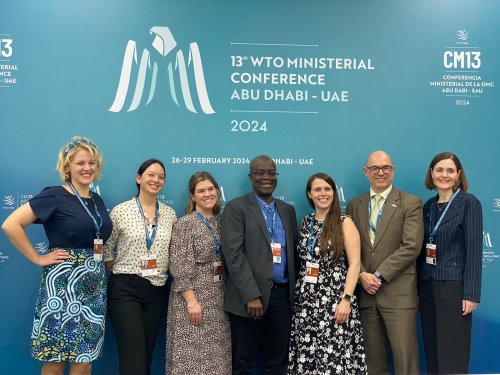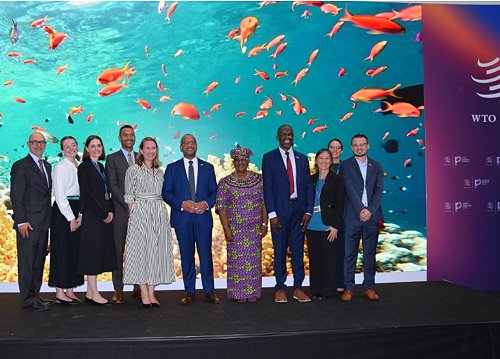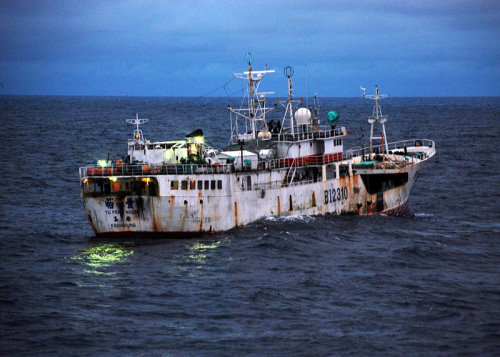
Change-makers at the Ministerial Conference (MC13) of the WTO (courtesy Pew Charitable Funds)
After more than 20 years of foot dragging negotiations, the first Agreement to limit harmful fisheries subsidies has entered into force on September 15, 2025, thanks to meeting the threshold of 111 ratifications or formal letters of acceptance. The text had been adopted by the 13th Ministerial Conference (MC13) of the World Trade Organization (WTO) in Geneva in 2022. It is the first WTO deal explicitly addressing a serious environmental concern and thus opens a new chapter in trade relations between the 166 WTO members. This important step deserves to be celebrated in a world where essential international cooperation in the face of common threats like damage from climate change, unfair social and economic burdens affect those least responsible, and massive biodiversity loss engendered by overfishing, is more important than ever.
Right from the beginning it was clear that this first step needed to be followed by several others to harness all the desired economic and environmental benefits in a socially equitable manner. The estimated USD 22 billion of annual harmful subsidies that go overwhelmingly to industrial fisheries have financed overcapacity and dwindling resources. The overcapacity has also massively favoured hardship of fish workers on industrial vessels, often trafficked or in bonded relationships, and deprived men and women in small-scale fisheries of their livelihoods.
The broad ‘Stop Funding Overfishing’ Coalition with help from researchers, foundations and concerned citizens has supported the negotiation process for many years to bring this agreement about. The Coalition, of which Mundus maris is an active member, celebrates this important step forward and invites all WTO members, which have not yet filed their acceptance, to do so soonest to ensure the broadest possible consensus for implementation.

Moments of celebration (Courtesy Coalition)
Meanwhile a ‘WTO Fish Fund’ has been set up with voluntary contributions in order to support the implementation of the Agreement. Access to the fund is open already to WTO members which have deposited their instrument of ratification.
What are the key disciplines of the Fish 1 Agreement?
The Fish 1 Treaty covers only marine capture fisheries and its activities at sea. It has three main disciplines banning subsidies to:
- vessels and operators confirmed to be involved in illegal, unreported and unregulated (IUU) fishing, including the support vessels of such operations;
- vessels fishing resources which are determined as already overfished;
- vessels operating in unregulated waters in the areas beyond national jurisdiction and outside the purvue of regional fisheries management organizations (RFMOs).

Vessel suspected of illegal fishing (Courtesy US Coast Guard on Wikimedia Commons)
According to Art. 3 of the Agreement, the determination of IUU fishing can be made by a coastal WTO member affected by IUU fishing in its waters, by the flag state of the IUU vessel, or by a regional fisheries management organization with competence over the waters where the infringement has taken place. Evidence must be presented to ensure the fairness of the determination. The duration of the prohibition is supposed to reflect the seriousness of the infraction and whether it has been repetitive. Developing countries obtain a two-year grace period for any infractions of their vessels in their own waters. This can not be challenged by other WTO members.
Art. 4 covers the second prohibition and concerns subsidies for vessels fishing an already overfished stock, i.e. which already has seen its biomass diminish significantly and is in need of protection to recover. This status needs to be recognized either by the coastal member or the responsible RFMO on the basis of the best available scientific evidence. Some flexibility is introduced by allowing some subsidies if they serve to rebuild the stock or if management measures are already implemented for that purpose. A similar grace period of two years as in Art. 3 is applied for subsidies while recovering stocks of developing countries in their own waters.
Art. 5 groups together additional measures under the label ‘other subsidies’. It covers situations where there is no collective management responsibility, e.g. through a RFMO. In addition, WTO members commit to exercise caution in two types of situation, namely
- when their vessel flies the flag of another nation, and
- when the status of the fish stock to be exploited is unknown.
In other words, consideration of possible negative impacts is warranted, especially when available scientific information is weak or unavailable, and the risk of overfishing is high.
The Agreement also contains some specific notification and information obligations for the fisheries in question that go beyond the subsidy notifications under general WTO rules. There are also provisions for monitoring and compliance.
More business to be finished for significant improvements on the water
 To the deep regret of many WTO members and organisations working towards an end of harmful fisheries subsidies, in June 2022 at MC13, governments were unable to achieve unanimous agreement on more sweeping prohibitions for subsidising overcapacity and accept stricter rules for the types of banned subsidies. A step-wise approach was agreed to rescue the consensus on disciplines covered under Fish 1 while continuing negotiations for a more ambitious Fish 2 Agreement until the Ministerial Conference. This should bring about a more significant change of practices on the water.
To the deep regret of many WTO members and organisations working towards an end of harmful fisheries subsidies, in June 2022 at MC13, governments were unable to achieve unanimous agreement on more sweeping prohibitions for subsidising overcapacity and accept stricter rules for the types of banned subsidies. A step-wise approach was agreed to rescue the consensus on disciplines covered under Fish 1 while continuing negotiations for a more ambitious Fish 2 Agreement until the Ministerial Conference. This should bring about a more significant change of practices on the water.
Governments and the WTO secretariat, led by Dr. Ngozi Okonjo-Iweala, and supported by the Stop Funding Overfishing Coalition, are since working hard towards an agreement at the forthcoming MC14. It is scheduled to take place in Cameroon from March 26 to March 29, 2026.
A sunset clause in Fish 1 requires the Fish 2 Agreement to enter into force within four years after the start of Fish 1. If this were not achievable Fish 1 will also be terminated unless WTO members agree to keep it. We encourage WTO members to achieve agreement on an impactful Fish 2 Agreement.
Together with the speedy implementation of the 3rd implementation agreement under the Law of the Sea, namely the Treaty on the protection and sustainable use of biodiversity in areas beyond national jurisdiction (BBNJ for short) stopping harmful fisheries subsidies on a broader front holds significant potential to generate benefits of recovering ocean resources and that these accrue fairly to all and make space for low impact small-scale fisheries and their coastal stewardship.
Cornelia E Nauen
